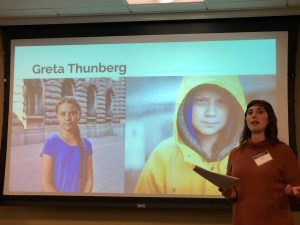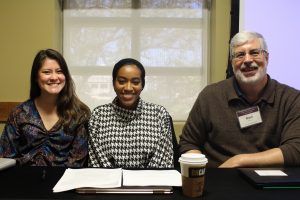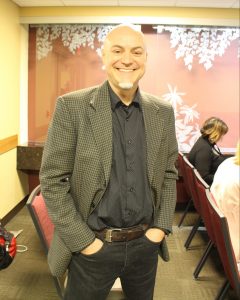Climate Conference Facilitates Healthy Conversations
In February, the Texas A&M Team Rhetoric Conference started important conversations around the increasingly urgent global climate crisis. Climate change is expected to be a dominant source of disruption in the next decade and the goal is to start conversations while there is still time to create change.
By M’kenna Norman

Zoe Clemmons, a researcher at Colorado State University in the Journalism & Media department, presented research about the way climate activist Greta Thunberg communicates on social media.
This spring, the Texas A&M Team Rhetoric Conference explored the different ways climate change is communicated and how that affects the world’s ability to respond effectively.
Dr. Nathan Crick, professor in the Department of Communication, coordinated the February climate conference to highlight the ways climate change is a communication, scientific, economic and political problem that must be clearly communicated while there is still time to effect change.
Over two days in February, Communicating the New Climate Regime: Confronting the Coming Barbarism brought together interdisciplinary scholars to address this increasingly pressing issue. Held at the Memorial Student Center, the conference was made possible by a grant from the Melbern G. Glasscock Center for Humanities Research, said Crick.
“The conference brought together largely communication scholars to talk about this from a variety of angles,” said Crick. “The idea was getting a small group of people, about 20, that we could have on campus and create more of a social experience for people where we could talk about our intellectual work.”
Because climate change affects everyone on the globe, it is expected to be one of the dominant sources of disruption in the next decade, explained Crick.

(L-R) Researchers who presented during the two-day conference included Giselle Warren, Texas A&M, on parallels of the Catholic Church’s use of Dante’s Inferno and climate change; Iman Ahmed, Texas A&M, on how presidential rhetoric can influence climate change views; and Mark Ward Sr., University of Houston-Victoria, on anti-intellectualism as evangelical culture and social identity.
“Climate change has economic impacts, political impacts, and even war,” said Crick. “It disrupts agriculture, desertification and flooding creates a battle over resources.”
Bringing different research aspects together allows climate change to be studied from a communication perspective, which can be the best way to study different facets of climate change, said Crick. It is also important to start these conversations now, while there is time to create change, he added.
“From a personal perspective, I have four kids, and when I start to think about their futures I imagine a variety of scenarios,” said Crick. “You start wondering if the things you take for granted are going to be true in the sense of ‘Hey, I’d like to take my kids to Venice in five years.’ But Venice might be underwater in five years.”
The conference served as a stimulus to begin new studies to investigate climate change, said Crick.

Professor Nathan Crick, Texas A&M Department of Communication, coordinated the climate conference.
“As a mid-career scholar, you want to do something that is going to speak to an issue that people care about,” said Crick. “You want to make a difference.”
The immediate impact of this type of conference is on the participants, said Crick. It’s always rewarding to be able to meet people and discuss ideas everyone cares about.
“I would hope this might be a book of my own at some point, and it stimulates me to think about the large question on how to deal with the question of climate change,” said Crick.
“The classroom is where a lot of these ideas are incorporated,” said Crick. “Not necessarily to tell people what to think, but to say this is something to think about.”
Conferences like this are also a way to inspire young scholars, said Crick, which can lead to future research or even books that in turn, spark more ideas and positive changes.
“I think that is where we have most of our impact – in the classroom,” said Crick.
- Events
- Faculty
- Research
- Black Lives Matter Texas A&M University
- Climate Change
- Climate Conference
- Communicating the New Climate Regime
- Communicating the New Climate Regime: Confronting the Coming Barbarism
- Communication Skills
- Confronting the Coming Barbarism
- Department of Communication
- Dr. Nathan Crick
- Faculty
- Melbern G. Glasscock
- Melbern G. Glasscock Center for Humanities Research
- Memorial Student Center
- MSC
- Nathan Crick
- TAMU
- TAMU Research
- TAMU Students
- Texas A&M Research
- Texas A&M Team Rhetoric Conference
- Young Scholars
